Contest conducted by Marc Smith
The 2025 annual competition is now well underway. As we approach the midpoint of the year, contenders are starting to jostle for places on the leader-board. Remember that only your best nine scores will count, so entering every month will enable you to drop your three weakest scores.
One of this month’s guest panelists is the solo winner of the March competition, Paul Boudreau from USA. Paul is a semi-retired computer programmer who moved from Needham, MA to the Los Angeles suburbs in 1978. Now unable to attend tournaments, he has been a student of this great game for over 50 years. He won The Bridge World Master Solver's Club title in 2018, and he enjoys discussing bridge with his brother, Bob, who is also a regular competitor in this competition. Paul finished third in the 2024 annual competition and is already amongst the leaders for the 2025 title. We are also joined by Rob Brady, a bridge streamer, YouTuber, and WBF/NABC commentator who retired from professional play about 10 years ago. He has three second-place finishes in NABC BAM events to his name. Rob’s extensive analysis of the RealBridge panel problems each month and, once the competition has closed, the panel’s responses, can be found by searching for ‘Bradybot’ on YouTube.
Two of this month’s problems have been sent to me: Hand 3 by panelist Alan Mould, and Hand 5 by one of my former partners, David Jones. Thanks to them. If you have a hand that you think would make an interesting problem for the panel to discuss, please send me details.
The panel produce a majority vote on only two hands in this set, one with a huge majority and the other in a close two-way split. On the remaining deals, they are widely split, which means that there are quite a few high-scoring choices from which competitors can choose.
The most popular action chosen by the competition entrants scores ‘10’ on only two of the eight hands, but voting with the largest group of competitors this month scores a very creditable 71/80 (up from 63/80 in April). The average score this month is our highest ever, 61.41 (up from 54.97 on Set 25-04). Let’s see what the panel have to say about this month’s hands…
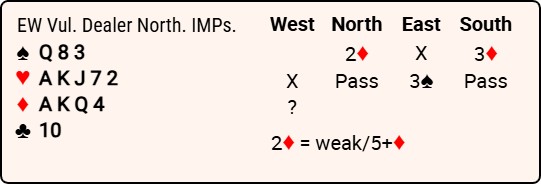
|
ACTION |
MARKS |
PANEL |
Competitors' |
|
6♥ |
10 |
6 |
5 |
|
4♦ |
9 |
6 |
32 |
|
4NT |
7 |
4 |
31 |
|
5NT |
7 |
2 |
2 |
|
5♥ |
6 |
1 |
1 |
|
4♥ |
4 |
2 |
10 |
|
4♠ |
2 |
0 |
8 |
|
6♠ |
0 |
0 |
4 |
|
3NT |
0 |
0 |
3 |
|
6NT |
0 |
0 |
2 |
|
4♣ |
0 |
0 |
2 |
|
Pass |
0 |
0 |
1 |
|
5♦ |
0 |
0 |
1 |
|
5♠ |
0 |
0 |
1 |
|
5NT |
0 |
0 |
1 |
Competition Entrant Average Score: 6.31
We start with a problem to which the panel offers no particularly convincing solution. Over two-thirds of competition entrants pick one of the three top-scoring options, but only 1-in-20 collect a maximum. Let’s hear first from those panelists who start with a cue-bid…
HANOI RONDON: 4♦. A slam is possible, but we have to show a strong hand first. I think a cue-bid does the trick.
DAVID BIRD: 4♦. Partner may have four spades and longer clubs. I will just show a strong hand, intending to bid my hearts next, and hope to find our best fit.
That all sounds a bit woolly to me. Mats at least has a plan…
MATS NILSLAND: 4♦. I am trying to set spades as trumps.
WENFEI WANG: 4♦. If partner is 5-4-0-4, maybe we will find a heart fit.
If partner bids 4♥ it’s a suit? Might he not cue-bid a control, thinking that 4♦ agrees spades?
MIGUEL VILLAS-BOAS: 4♦. I’ll start with 4♦, then Blackwood for spades. If my partner gives me three key-cards, I’ll bid 7♥.
What if he shows two key cards? Will 6♥ not then ask him to bid 7♠ with third-round heart control?
CHRISTIAN MARI: 4♦ I'm trying to get more information about the distribution before rolling out RKCB.
This looks to be closer to the mark…
PAUL MARSTON: 5♥. Time to come clean and show slam interest with hearts.
…but is it enough?
ANDREW ROBSON: 6♥. My best guess. Torturing partner some more (eg via 4♦) is unlikely to achieve much.
PAUL BOUDREAU: 6♥. I should have asked for aces over 3♦ and avoided slam opposite KJxx/Qxx(x)/x/KQxx(x) unless 4NT now is still just aces and 4♦ agrees spades. Since RealBridge is using 03/14, I suggest this enhancement: if responder to RKC is 'known' to have opening-hand values (including a takeout double, obviously), 14/30 should apply. This allows for more five-level escapes after a 5♣ response.
While that sounds like a good idea in theory, I have a feeling that it would lead to too many accidents in practise.
CATHY BALDYSZ: 6♥.
SJOERT BRINK: 6♥. I have no idea.... My rule is, “Never bid grand slam after a pre-empt.”
Sartaj and Liz highlight a significant danger of an alternative approach.
SARTAJ HANS: 6♥. Since there is no clear path to bidding RKC for hearts, 6♥ feels like the practical bid. Bidding key-card for spades is asking for trouble.
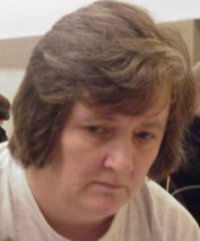
LIZ McGOWAN: 6♥. It would be nice to know my partner's style here. Given the likely diamond void and spades longer than hearts, might she be 4306? I would expect a weakish hand with five spades to prefer an overcall to a takeout double. If she is 4-3 in the majors, she should have ♠AK and ♥Q, else she may have preferred to overcall 3♣. If I ask for key cards with spades agreed, I will not then be able to insist on hearts as trump, so this seems a practical shot.
It seems to be a point missed by many of the Blackwood bidders.
JOEY SILVER: 4NT. Partner rates to have at least a five-card spade suit (Why? MS), so I will simplify the auction, and try to Blackwood our side to a small or grand slam.
ROB BRADY: 4NT. Keycard in spades. Partner made the perfect bid to let me ask about the missing honors. It could be right to play in hearts opposite a hand such as Axxxx/Qxxx/-/AKxx or no-trump opposite AKxx/xxx/x/KQJxx. We may never get back there, but this time partner has all the keycards... right?
SIMON DE WIJS: 4NT. 4♥ forcing would be a great alternative. Lacking that, I will key-card and bid 6/7♥ based on the response and play partner for ♥Q.
MARTY BERGEN: 4NT. Keycard for spades. That doesn’t mean that we must end up in spades.
A couple try to consult partner…
ALAN MOULD: 5NT. Pick a slam. I really have no idea what to do, as this bid doubtless shows.
SALLY BROCK: 5NT. Pick a slam? Surely this should suggest five hearts and three spades in this auction.
This just seems to be not enough…
LARRY COHEN: 4♥. My plan was always to double and then bid hearts, so even though there are other temptations, I'll stick with the plan. With partner short in diamonds, there is a good chance he has 3+ hearts and, even opposite a doubleton, this should be ok.
JILL MEYERS: 4♥. To me, this shows a slam interest hand with long hearts. I have a lot of points, but partner's takeout double could be an 11-count with 4-3-1-5 distribution. His 3♠ bid does not promise five spades.
At the table in the Vanderbilt, West simply jumped to 6♥. Partner produced Kxxx/Qxx/x/AKxxx, so making 12 tricks was a straightforward proposition. Those Blackwooding for spades may find themselves unable to get into hearts. Regular partnerships should discuss continuations after Blackwood responses and the shape expectations, as Sally suggests above, for 5NT in this sort of auction.
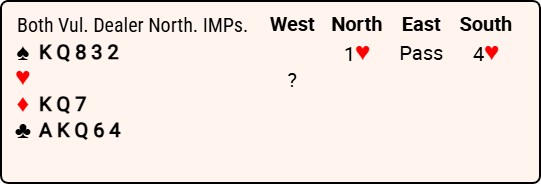
|
ACTION |
MARKS |
PANEL |
Competitors' |
|
Dbl |
10 |
11 |
47 |
|
4♠ |
9 |
10 |
27 |
|
4NT |
4 |
0 |
11 |
|
5♥ |
4 |
0 |
8 |
|
5♣ |
0 |
0 |
5 |
|
Pass |
0 |
0 |
1 |
Competition Entrant Average Score: 7.89
For the panel, this was a simple two-way choice, and almost three-quarters of competitors chose one of those same options.
LARRY COHEN: 4♠. Principles of a lifetime - if 4♠/4♥ is possible, just do it. Here, I do worry we might miss a slam, but I can't risk the five-level on my own. The odds are surely that partner has no aces.
MARTY BERGEN: 4♠. I am aware that I might go down here when we are cold for slam in a minor.
PAUL MARSTON: 4♠. Too much risk to look for slam. I am just trying to lock in the best game.
DAVID BIRD: 4♠. North is a huge favourite to hold the two aces that I am missing. I like my prospects in 4♠ better than defending against 4♥-doubled.
SARTAJ HANS: 4♠. A spade fit is not guaranteed, so 5♥ risks taking us too high. I prefer to be conservative to slam on an auction where the opponents have created a lot of friction for us. Perhaps spades 4-1 dooms the slam even if partner does have a pointed-suit ace.
LIZ McGOWAN: 4♠. Fixed! Opponents are vulnerable this time, so I doubt partner has an ace. I cannot bring myself to double - that would deny five spades and encourage partner to leave it in on a relatively balanced hand for -790. (If she pulled to 5♦ that might be our best spot.) If they double 4♠ I shall run, wimpishly.
SIMON DE WIJS: 4♠. Double will be passed too often, I feel. I will pass their double unless my table feel says otherwise.
ROB BRADY: 4♠. It’s either 4♠ or Double? Is partner 3-3-4-3 or 2-2-5-4? What is the best use for a 2♦ opening bid? Some questions we will never know the answer to. Maybe I should prefer the flexible double, but I like to declare.
WENFEI WANG: 4♠. Maybe double is better, but who knows?
ANDREW ROBSON: 4♠. Standard choice. Of course, double could work better - or a lot worse.
Plenty there who acknowledge that double may be the winning choice.
SJOERT BRINK: Dbl. 4♠ is the alternative.
CHRISTIAN MARI: Dbl. 4♠ is tempting, but too dangerous.
CATHY BALDYSZ/JILL MEYERS: Dbl. Takeout.
MATS NILSLAND: Dbl. There is much guessing involved. I think the spades are too weak to bid 4NT.
ALAN MOULD: Dbl. I am not driving slam, so it is a choice between Double and 4♠. This will end the auction almost always, but the opponents are vulnerable so, hopefully, at worst it would be +500 against +650. Maybe 4♥ makes? Well yeah maybe, but then maybe 4♠ goes off...
JOEY SILVER: Dbl. I hate making a takeout double at this level with a five-card spade suit but, with three possible trump suits and only two losers, I cannot see any other way around this problem. If partner bids 4♠, I will gamble with Blackwood, and if he bids a minor I probably will close my eyes and bid slam. If he passes, I will close my eyes and curse.
That is an interesting question for another time – is 4NT Blackwood or pick-a-minor over a 4♠ bid from partner?

Paul makes a good point about partner’s diamond response.
PAUL BOUDREAU: Dbl. I will chance 5♥ over 4♠, and I have an obvious 5♣ bid if he bids 4NT. Since he has two ways of bidding 5♦ (directly or after 4NT) I can raise to 6♦ when he uses the stronger version on his A-x-x-x-x-x.
SALLY BROCK: Dbl. I think the question is whether or not we are prepared to drive to the five-level. If so, then that rules 4♠ out. So, it is a choice between Double and 5♥. I would like to keep diamonds in the game. Partner will be pretty reluctant to bid 5♦, certainly not with only a four-card suit. If he bids 5♦, I will bid 5♠, hoping that I’ve shown a flexible hand like this.
HANOI RONDON: Dbl. I have two great places to play, I can also play in the third suit, and even if partner passes the double we should do fine.
MIGUEL VILLAS-BOAS: Dbl. I think that I need a little more to bid 4NT.
Both West players faced this problem in the recent Camrose match between England and Ireland. The English West overcalled 4♠ and played there. The Irish West doubled and, when his partner bid 4♠, continued with 5♥. (This is the route suggested by Paul above.) East jumped to 6♠, which was an easy make opposite AJ10x/xx/xxx/Jxxx.
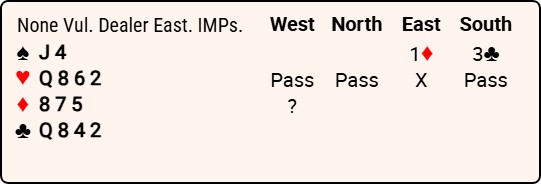
|
ACTION |
MARKS |
PANEL |
Competitors' |
|
Pass |
10 |
9 |
31 |
|
3♥ |
9 |
7 |
46 |
|
3♦ |
8 |
5 |
17 |
|
3NT |
0 |
0 |
4 |
|
4♣ |
0 |
0 |
1 |
|
4♦ |
0 |
0 |
1 |
|
4♥ |
0 |
0 |
1 |
Competition Entrant Average Score: 8.60
This is another high-scoring deal. There are only three realistic choices, and all received a fair amount of support from both the panel and competitors. All three options have advocates who think their choice is clear…
CATHY BALDYSZ: Pass. I take the sure plus.
SJOERT BRINK: 3♦. What else?
PAUL BOUDREAU: 3♥. Passing is MUCH too risky at IMPS.
So, there you have it 😊
PAUL MARSTON: Pass. I’d rather gamble on taking five tricks against a club contract than trying to score nine tricks in hearts.
SALLY BROCK: Pass. This would depend a bit on my opponents, I guess, but +300 looks like a real possibility, and we are a long way from game. I would prefer my pointed suits to be the other way around, but you can’t have everything.
SIMON DE WIJS: Pass. I will lead the ♠J and hope for the best.
SARTAJ HANS: Pass. The key on such hands is often to try to go plus. The degree of the minus score (-100 to -470) can be sharp but it is not tragic. Minus 100 to Plus 100/300 can be equally rewarding. Of course, a lot depends on the style of the opponents. These days, almost everyone is bidding on almost anything.
A few mention a major reason for passing…
JOEY SILVER: Pass. Not knowing which red suit to bid, I'll compromise, and bid nothing!
HANOI RONDON: Pass. Passing seems a good option so as not to have to choose a red suit.
ANDREW ROBSON: Pass. Paper tiger and lead the ♠J. One problem with not passing, is what to bid: 3♦ or 3♥.
MATS NILSLAND: Pass.
When Alan Mould sent me this hand, I replied that 3♦ looked obvious. He enjoyed chortling as he told me that was the only losing option. Let’s see what its advocates have to say.
MARTY BERGEN: 3♦. At matchpoints, I would pass.
LIZ McGOWAN: 3♦. Is partner doubling on distribution or strength? She will surely be hoping for more than this in my hand, so I make the weakest possible squeak. 3♣-doubled might collect +300 on a good day but, with my luck, -470 seems more likely.
ROB BRADY: 3♦. I want partner reopening to protect us on all sorts of shapes, so I bid the suit with our most likely fit. I hope today isn't the one time partner is 4-4-4-1.
Or, see Larry’s comment below!
WENFEI WANG: 3♦. I’m afraid if I bid 3♥, partner raises to 4♥.
But how else will you score +420? 😊
CHRISTIAN MARI: 3♥. Cowardly, I know.
JILL MEYERS: 3♥. At matchpoints, I would take my chances and pass, but I am unwilling to try that at IMPS. 3♦ is a reasonable option as well.
MIGUEL VILLAS-BOAS: 3♥. In matchpoints I can pass, but playing IMPs I prefer 3♥.
LARRY COHEN: 3♥. Pass is out of the question. I can't see choosing diamonds over hearts, as partner could easily be 4-4-4-1 (and, on a really bad day, 4-4-3-2).
DAVID BIRD: 3♥. I must choose from a bundle of unsatisfactory actions. I rate 3♥ a better prospect than 3♦. Partner's shape could be 4-4-3-2!

Last word goes to the panelist who knows the hand.
ALAN MOULD: 3♥. I sent this hand in. At the table, there were two winning options, Pass and 3♥ (which partner will raise to 4♥). The losing option, found at the table, is 3♦. That, partner, with his 3-4-4-2 19-count, cannot make. I don't know what the percentage bid is on this hand, but I just feel that 3♦ is not giving you any bang for your buck. I shall be interested to see what the panel say.
If partner is 4-4-4-1 or 3-4-5-1, bidding 3♥ is likely to be right. If he is 4-3-5-1, 3♦ should be best. Opposite 3-4-4-2 or the dreaded 4-4-3-2, either 3♥ or pass could work. Opposite 4-3-4-2, pass is surely most likely to be the winning option. So, perhaps there is no ‘right’ answer, although I think the passers had the best of the debate. Alan’s comment about the potential upside of each option is certainly pertinent too.
At the table, partner had a 3-4-4-2 19-count, so you could make +420 in 4♥, get +500 from defending 3♣-doubled, or go minus playing in 3♦.
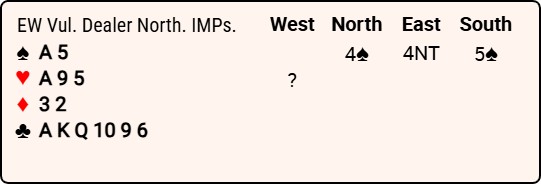
|
ACTION |
MARKS |
PANEL |
Competitors' |
|
5NT |
10 |
10 |
11 |
|
6♣ |
9 |
8 |
49 |
|
7NT |
8 |
2 |
4 |
|
7♣ |
8 |
1 |
16 |
|
6♥ |
7 |
0 |
2 |
|
7♥ |
7 |
0 |
1 |
|
6NT |
6 |
0 |
7 |
|
Dbl |
4 |
0 |
9 |
|
6♠ |
0 |
0 |
1 |
Competition Entrant Average Score: 7.78
The panel’s view of this deal is very different to what happened at the table. I saw the auction start this way at three tables in the Vanderbilt: two West players jumped to 7NT and the other (a regular panel member who is not here this month) bid 6♥. Our panel is essentially split two ways, with half of competition entrants choosing one of those options. Let’s start with the largest faction on the panel.
WENFEI WANG: 5NT. First, I want to know which suits partner has.
MARTY BERGEN: 5NT. "When in doubt, make the cheapest reasonable bid."
SARTAJ HANS: 5NT. Most of those beautiful points in the black suits might end up being useless.
Some tell us how they plan to continue…
ANDREW ROBSON: 5NT. I will convert 6♦ to 6♥.
ROB BRADY: 5NT. I expect partner to bid 6♦ to show the red suits, and I'll correct to 6♥. This should imply some interest in a grand, as I could have bid 6♣ pass/correct with a signoff. Will partner know I'm looking for -/KQJxxx/Axxxxx/x and not -/KQJxxx/KQJxxx/x? Find out in June's edition!

Joey throws up an interesting possibility, but can partner really have clubs?
JOEY SILVER: 5NT. Just to confirm that partner has the red suits. I intend to bid a cowardly 6NT over 6♦, and in the unlikely event that partner bids 6♣, I will pass and then ‘save’ in 7♣ over the villains’ 6♠ sacrifice.
Some have higher expectations.
MATS NILSLAND: 5NT. I suspect that partner has the red suits. I am going for seven something.
LARRY COHEN: 5NT. I am going to insist on a grand slam opposite a partner who contracted vulnerable for eleven tricks. But, 5NT pick a slam and then 7♣ might somehow get the picture across to a partner with something like --/KQxxx/AKQxxx/Jx.
There seem to be 13 tricks in NT opposite that too.
MIGUEL VILLAS-BOAS: 5NT. 99% my partner has the reds, but 5/5 strong or 6/6 not too strong? I’ll bid 5NT first. They probably have a good save in spades and we can make 7NT.
So, 5NT clearly asks which suits partner has. Is 6♣, therefore, natural or, as Rob suggests above, pass-or-correct?
ALAN MOULD: 6♣. I have no idea!
Most seem to think it is natural…
CHRISTIAN MARI: 6♣. This could be a better contract than 6♥.
HANOI RONDON: 6♣. If partner doesn't pass, I can rebid 6NT next time.
DAVID BIRD: 6♣. Yes, partner probably has the red suits, but I see no harm in passing the message: 'My clubs may be a better trump suit than either of your red suits.' At the same time, I pick up the rare case when partner has five clubs. What help is 5NT, when you are fairly sure you will hear to 6♦?
PAUL BOUDREAU: 6♣. I am giving partner lots of rope, eg. Void/KQJxx/KQJxxx/xx. He can correct to 6♦ on KQJ10xx or AKQJxx (missing the grand).
LIZ McGOWAN: 6♣. I suppose partner has a red two-suiter so most of my cards are not much use to her. When she bids 6♦ I shall convert to 6♥.
I think Simon is right.
SIMON DE WIJS: 6♣. Partner will always correct 6♣ to 6♦ I feel, but I am trying anyway and will correct 6♦ to 6♥. We might be cold for seven, obviously. Then again: I think I remember this hand and I should have doubled instead :)
I am fairly sure that all of those above will have been faced with a 6♠ bid from North. The interesting question then is whether partner should pass or double. Jill’s solo choice is surely natural, and whether it will also attract another bid from North is unknown.
JILL MEYERS: 7♣. It is true partner is likely to have hearts and diamonds on this hand, but that does not mean we won't make 7♣.
The final two bid what they think they can make, and is that so unreasonable opposite something like --/KQJxx/AJxxxx/xx? Isn’t that five hearts, six clubs and two aces?
SALLY BROCK: 7NT. My best guess!
SJOERT BRINK: 7NT. I know the hand.....
On this amazing deal from the 2025 Vanderbilt, Michal Klukowski jumped to 7NT. That was doubled and partner produced ---/KQ10xx/K1087xx/xx. That was six down for -1700 when neither hearts nor clubs broke. Teammates lost 300 in 6♠-X, saving against the failing 6♥, so that was 19 IMPs out. In another match, South jumped to 6♠ after the same start and, again, West essayed 7NT. Here, though, North (who held K109xxxx/--/AQJxx/x but was not on lead) did not double, so 7NT escaped for ‘only’ -600, which was a 5-IMP gain!!! In the replay here, West bid 6♥ in the problem situation, and that went (6♠)-7♥-(Dbl) which cost 800. Remarkable!
What value the pre-empt!!! It seems that everyone who opened 4♠ on the North hand got a 4NT overcall from East and subsequently went plus. Those who started with 1♠ generally went down in 5/6♠-doubled.
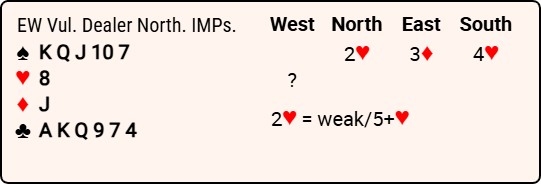
|
ACTION |
MARKS |
PANEL |
Competitors' |
|
5♣ |
10 |
6 |
22 |
|
4♠ |
9 |
5 |
29 |
|
4NT |
8 |
4 |
11 |
|
5♥ |
7 |
1 |
5 |
|
Dbl |
6 |
1 |
18 |
|
5NT |
6 |
1 |
3 |
|
6♣ |
6 |
2 |
9 |
|
6♠ |
6 |
1 |
1 |
|
Pass |
0 |
0 |
1 |
|
5♦ |
0 |
0 |
1 |
|
5♠ |
0 |
0 |
1 |
Competition Entrant Average Score: 7.90
The panel offer support for eight different options, with none of them attracting as many as a third of the votes. The competition entrants were also widely spread, although more than half picked up one of the top two marks. Some started with a cheap bid in their major…
ALAN MOULD: 4♠. Your problems are too hard, Marc.
ANDREW ROBSON: 4♠. Very difficult. I considered 5NT (pick a slam) and 6♣, but these could easily get us to a two-ace slam. Not that 4♠ is safe - we could lose trump control.
WENFEI WANG: 4♠. To play.
JILL MEYERS: 4♠. Partner is very likely to have a secondary fit with me somewhere. Either 4♠ or 5♣ could be right.
Sage advice borne of experience from Paul.
PAUL MARSTON: 4♠. More unbelievably strong hands, given the bidding. I am simply trying to lock in game. I am not worried about reaching slam when the bidding is wild.
Others prefer to bid their longest suit…
DAVID BIRD: 5♣. I will place my chips on the sturdier trump suit. 4♠ on a 5-2 or 5-1 fit may disintegrate on a forcing defence.
CHRISTIAN MARI/CATHY BALDYSZ: 5♣.
A couple tell us their intention if the opponents bid again…
SIMON DE WIJS: 5♣. A mild underbid, but I am counting on bidding 5♠ over their 5♥ later.
MIGUEL VILLAS-BOAS: 5♣. I don’t have a good bid on this hand. I will start with 5♣ and, over 5♥ by the opponents, I’ll then continue with 5♠.
…but they don’t say what they will do over 5♦ from partner. It sounds like Joey is in that camp too.
JOEY SILVER: 5♣. I am tempted to guess at slam but, at this vulnerability, with the possibility of any of my three opponents bidding again, I'll go low, and keep my spade suit in reserve to bid later.
Sartaj also keeps himself in with a chance of a plus score on this round, but…
SARTAJ HANS: Dbl. If partner bids, we should be well placed. I'll correct 5♦ to 6♣, expecting him to correct back to 6♦ some of the time at least when its right. If partner passes the double, we might miss a cold slam, but the alternative of forcing to slam with 5NT, pick a slam, is not appealing for multiple reasons.

Larry earns “Comment of the Month” honours for honesty…
LARRY COHEN: 4NT. I am too strong to double or to bid a black suit. Slam is so likely. I wish I knew what my 4NT bid means. Maybe partner will know. 😊
Perhaps Larry and Sally should have a game together…
SALLY BROCK: 4NT. I am not sure exactly what this means, but I nearly never play RKCB in this sort of auction. I expect partner to take me for a black two-suiter.
Paul is sure he knows what it means.
PAUL BOUDREAU: 4NT. 4NT must be RKC for diamonds. If he has something like xx(x)/Kx/AKQxxx/xx(x), we can rest in 5♠. I will bid 6♣ if he shows three key cards, and an optimistic 7NT (needing ♣J or clubs to break) if he shows four.
Liz knows what she wants it to mean.
LIZ McGOWAN: 4NT. As a poor card holder, this is not my area of expertise. I think 4NT is two-way: either a big two-suiter with the unbid suits, or a good diamond raise. Partner should assume the former, and bid 5♣ with three-card support, and 5♦ otherwise. Over 5♦, I shall try 5♠, showing a hand too good for 4♠ last time. With something like Axx/xx/AKxxxx/xx, she will then raise to slam (dream on!)
Mats almost commits to the six-level…
MATS NILSLAND: 5♥. Another problem that seems impossible to solve. Anything can be right.
…whilst the rest all do, by some route or another.
ROB BRADY: 5NT. I'll gamble on partner holding two aces for the vulnerable overcall. Question for the panel: how many clubs does partner need to bid 6♣ over this? We can pull 6♦ to 6♠ safely, since even as little as Ax/xxx/AKxxxx/xx makes 6♠ a favorite with our strong trumps.
SJOERT BRINK: 6♣. Difficult hand.... I hope they save in 6♥. (Although, I have no idea if I have to then bid 6♠.)
HANOI RONDON: 6♣. It's a great suit and I'm counting on partner for a couple of aces.
MARTY BERGEN: 6♠. Hoping (praying) that partner has two aces, or that the opponents save in 7♥.
When the hand occurred at my table, it went (3♥)-5♦-(Pass) to this hand, and the West player passed in tempo without even a blink. (I’m not sure I would have managed that, facing a jump to the five-level at red.) East had xxx/Kx/AKQxxxxxx/---, so you could make 5♦ (despite the 4-0 trump break). With North holding both major-suit aces, you can also make the same 11 tricks in spades, as the defenders cannot play a diamond to cut you off from dummy’s red-suit winners. Partner presumably passes 4♠ and bids 5♦ over 5♣. Those who do not intend to bid again will go plus. Those who know what 4NT means might get to a making game. Some will just manage to put the brakes on in 5♠. This was not a good combination for the optimists.
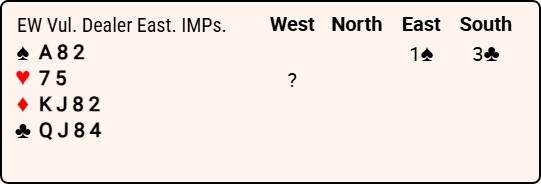
|
ACTION |
MARKS |
PANEL |
Competitors' |
|
3NT |
10 |
8 |
18 |
|
4♠ |
9 |
5 |
22 |
|
Pass |
8 |
3 |
6 |
|
3♠ |
7 |
3 |
39 |
|
Dbl |
5 |
1 |
9 |
|
3♦ |
5 |
1 |
3 |
|
4♣ |
0 |
0 |
3 |
Competition Entrant Average Score: 7.59
There is not a great deal of agreement on this one. When I set the hand, I thought it was a choice between Pass, 3♠ and 4♠, so it is a surprise to me to find that none of the above attracted the most panelists. Let’s start with those who raise spades, as those are the options that may provide the most ammunition for partnerships to discuss. First, those panelists supporting the choice of over a third of competitors.
CHRISTIAN MARI: 3♠. A slight underbid, isn't it?
ROB BRADY: 3♠. Director please! My right-hand opponent keeps taking advantage of the vulnerability and pre-empting. I'll support partner and aim at the vulnerable game, but 3NT or even going after a penalty could be the winner.
SARTAJ HANS: 3♠. Support with support. Zia made an observation once that the likes of Meckstroth, Hamman and Helgemo always choose to support partner in such cases. What's good enough for those three (four?), is good enough for me.
Support, yes, but I wonder how many of those might prefer 4♠ to 3♠?

Sally makes the case that 3♠ is not enough.
SALLY BROCK: 4♠. As a general rule, I am willing to allow them to push me up one level. I think this hand is too good for 3♠, as partner will play for me to have stretched.
ALAN MOULD: 4♠. An overbid, but I cannot stomach bidding 3♠ and watching partner make ten easy tricks. 3NT could be right, but seems a bit unilateral.
PAUL MARSTON: 4♠. It is too soon to blow the whistle.
LARRY COHEN: 4♠. I can't play around vulnerable at IMPs and bid only 3♠. 3NT could be an outlier winning decision, I suppose.
ANDREW ROBSON: 4♠. My first thought was to pass, and convert. However, 4♠ rates to make and the vulnerability is bad for the penalty pass route. Should we bid 4♣ to show a high-card raise in spades? Perhaps, but we are not really good enough.
So, what about playing to defend?
SIMON DE WIJS: Pass. Partner will bid again if we have a game, so I'll pass for now.
PAUL BOUDREAU: Pass. I expect a reopening double, and I will happily pass. 3NT would be my second choice.
Joey is out for blood.
JOEY SILVER: Pass. It comes down to what has more value, bidding 3♠ or 4♠, or putting on my fur cap hoping partner will not betray me. Since I come from the northland, I'll put the hat on.
This was the choice of the largest faction…
WENFEI WANG: 3NT. I have two slow stops in clubs, so 3NT may be better than 4♠.
HANOI RONDON: 3NT. I have a double stopper in their suit, so this may be a safer bet than 4♠.
JILL MEYERS: 3NT. This seems like a practical bid.
MARTY BERGEN: 3NT. These clubs are screaming, "play NT or defend." But, if I pass, partner may also pass, or we might not beat them enough. And, if partner pulls, I will bid 4♠ with better support than he is expecting.
CATHY BALDYSZ: 3NT.
DAVID BIRD: 3NT. I am certainly not going to pass, when my obvious consideration (even if only two or three seconds long) will put partner under ethical pressure. In any case, my expectations in 3NT may be better than those defending 3♣-doubled.
MIGUEL VILLAS-BOAS: 3NT. 3NT is a dangerous option, but 3♠ is an underbid and vulnerable I like to bid more aggressively.
LIZ McGOWAN: 3NT. "The contract most often let through when it can be beaten" (Kelsey)
There were just a couple of solo fliers…
SJOERT BRINK: 3♦. Showing a limit raise in spades. After, I may be able to suggest 3NT.
This must be a special agreement. To me, 3♦ is simply natural and forcing.
MATS NILSLAND: Dbl. I intend to bid 3NT over 3♥.
Both West players faced this problem in the Round of 16 Vanderbilt match I saw. One jumped to 4♠. The other passed, then passed again when his partner reopened with a double. East had Kxxxx/KJx/A10xx/A so, with a 3-2 trump break and some good guesses in the red suits, 4♠ made 11 tricks for +650. 3♣-doubled, though, was five down for +1100 and 10 IMPs. 3NT may be uncomfortable if North can find a heart lead. This certainly looks like a moral win for the passers.
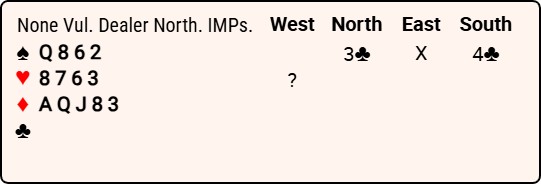
|
ACTION |
MARKS |
PANEL |
Competitors' |
|
Dbl |
10 |
18 |
52 |
|
4♦ |
5 |
2 |
24 |
|
5♣ |
5 |
1 |
5 |
|
4♥ |
2 |
0 |
8 |
|
4♠ |
2 |
0 |
5 |
|
5♦ |
2 |
0 |
3 |
|
Pass |
0 |
0 |
2 |
|
4NT |
0 |
0 |
1 |
Competition Entrant Average Score: 6.97
Sorry – I don’t know what the question setter was thinking, so we won’t waste much time on this one. A huge majority from the panel, and more than half of competitors collect this month’s easiest maximum. I was feeling generous, so a token couple of marks to anyone who just picked a game.
CHRISTIAN MARI: Dbl. Horrible, but…
LIZ McGOWAN: Dbl. Doesn't everybody?
DAVID BIRD: Dbl. What else? I can't head for a slam with only a queen in partner's likely suits.
SIMON DE WIJS: Dbl. No other option, I feel.
JILL MEYERS: Dbl. This is a responsive double, generally with 4-4 in Majors, but sometimes 3-3.
WENFEI WANG: Dbl. Double is takeout here.
MIGUEL VILLAS-BOAS: Dbl. I can play in both majors.
JOEY SILVER: Dbl. Not knowing what suit to bid, I'll let partner make the last mistake!

SALLY BROCK: Dbl. This is strongly for take-out, I think, as I need to be able to bid it with both majors. The more clubs partner has, the fewer he will play me for!
Some were philosophical about partner passing…
LARRY COHEN: Dbl. I am not happy, especially if partner passes, but I don't want to guess to bid any suit.
PAUL MARSTON: Dbl. I am willing to play game in partner's major. 4♦ won't get there. Hopefully, partner does not pass.
ALAN MOULD: Dbl. Partner will doubtless Pass, but I cannot see how I can guess the suit here.
SARTAJ HANS: Dbl. I am hoping partner bids, but there is no real alternative. Bidding a four-card major may lead to a seven-card fit, and bidding diamonds suggests a different hand-type.
But some were quite happy with the prospect.
ROB BRADY: Dbl. As little as KJxx/AKx/Kxxx/xx could make a spade slam, but where are all the clubs? Doesn't it feel like partner might have a balanced 20-count over there? AKx/Axxx/Kxx/AQx could fit the bill, and +800 sounds nice. Let's see if partner pulls our double before we get carried away with our club void.
Sjoert offers regular partnerships something to discuss.
SJOERT BRINK: Dbl. For me, after 4♣ by opponents, 4♦ is always either a two-suiter or a slam try. So, 1♠-(4♣)-4♦ shows a slam try agreeing spades, and (4♣)-4♦ shows any two-suiter....
Paul sums up…
PAUL BOUDREAU: Dbl. I have no other choice, and they will no doubt be doing the same at the other table.
There were just a couple of mavericks.
MARTY BERGEN: 4♦. I believe and have written that, especially at IMPs, there definitely is a case that after partner acts and the opponents’ last bid is 4♣, a free-bid of 4♦ should be forcing! And, here, I am an unpassed hand. Obviously, a forcing 4♦ bid would be perfect here. Unfortunately, that agreement is not standard. But rather than guessing 4♠ (which might not make even opposite four-card support), I will risk partner passing and our playing in a part-score.
MATS NILSLAND: 4♦.
HANOI RONDON: 5♣. It looks like a responsive double, but we don't want to give partner a chance to pass. The five-level should be safe, and we might even get to a making slam if partner is better than minimum.
Partner had AKx/AKxx/Kxxx/xx, so 6♥ just needed a 3-2 trump break. 6♦ was better, needing either a break in one of the majors or one defender (presumably South) to hold four cards in both majors. In retrospect, it would have made a better problem to have given you the East hand after a responsive double from West. I suspect that 4♥, 5♥, 5NT and 6♥ would all have attracted support.
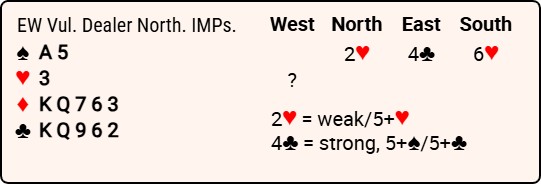
|
ACTION |
MARKS |
PANEL |
Competitors' |
|
Pass |
10 |
5 |
6 |
|
7♣ |
9 |
9 |
30 |
|
6♠ |
9 |
1 |
19 |
|
Dbl |
8 |
6 |
44 |
Competition Entrant Average Score: 8.37
We finish this set with a difficult board to score. There is no majority and, although the 7♣ bidders are the largest single group, they are outvoted 12-9 by those who do not want to commit to the seven-level. I think the passers have the best of the debate, hence the marking, although everyone scores fairly well. We start with the largest faction on the panel…
CHRISTIAN MARI: 7♣. Who is clever? We’ll see.
ALAN MOULD: 7♣. Let them guess.
SARTAJ HANS: 7♣. This might make, or they might take a dive.
SJOERT BRINK: 7♣. I need to support partner some time.
MARTY BERGEN: 7♣. A forcing pass would not show this much, and might promise first-round control in hearts. 7♣ definitely might be cold, and when I bid it in tempo, the opponents might save.
JOEY SILVER: 7♣. Taking a two-way shot: either partner has three aces or the villains will come galloping to our rescue and save.
LIZ McGOWAN: 7♣. They really got me this time. Partner might have KQxxx/--/Ax/AJxxx or KQxxx/--/x/AJTxxxx. Or she might not have a heart void. I think I am hoping they will bid on to 7♥...
SALLY BROCK: 7♣. I may be going down in a record number of grand slams this month!! Do I also play 3♥ from partner as two-suited (as seems to be the fashion)? A good hand for that so I now know that partner is too good for that. He might have a void diamond if he doesn’t have the ace!
Yes. You will surely have a weakish Michaels bid far more often than a hand that wants to play 3NT if partner has a stopper, so 3♥ would indeed show a Michaels-type hand not strong enough for a Leaping Michaels bid. Something else for regular partnerships to discuss.
SIMON DE WIJS: 7♣. A forcing pass will never get partner to bid seven without these cards, so I'm on my own again.
A small group aim for a making contract at the six-level…
ANDREW ROBSON: Pass. I think this should be forcing.
MIGUEL VILLAS-BOAS: Pass. Forcing. I want to give partner a chance to bid 6♠ with a good suit.
PAUL BOUDREAU: Pass. If my spades were A-J, I would bid 6♠. Pass MUST be forcing IMO (given the vulnerability) and I want to show tolerance for 6♠ or 7♣.

WENFEI WANG: Pass. I think pass is forcing. Maybe we can get to 6♠?
DAVID BIRD: Pass. Since a pass is forcing after this start, a double would be the only way to show a duff hand. Passing gives us a chance of playing in 6♠ if partner has some solidity in that suit.
Rob is out on his own, but I suspect that he is more likely to get a plus score than those in the panel’s largest group.
ROB BRADY: 6♠. In my experience, it has always been right to bid on over these six-level pre-empts... but how? I'll choose the bid that leaves the most room for error. Maybe we're off a heart or the ♦A. I hope partner has good spades. I certainly think this should be a forcing pass situation, but I’d hate to pass and hear it go Pass-Pass.
Larry agreed with the sentiment of the passers, but not the intention.
LARRY COHEN: Dbl. It is too much to hope for three aces and the ♠K for 7♣. Yes, pass would/should be forcing, but I don't really want to suggest 6♠.
Curiously, Jill comes up with almost partner’s exact hand, and yet not the winning answer…
JILL MEYERS: Dbl. I can't play partner for three aces. I expect something like KQJxx/x/A/AJxxxx, or flip the red suits.
And you don’t want to play 6♠ opposite that?
PAUL MARSTON: Dbl. More Ripley's. I hope they go down 😊
CATHY BALDYSZ/MATS NILSLAND: Dbl.
HANOI RONDON: Dbl. I can't put so much on partner's back. Is pass forcing? Should I bid 7♣ expecting partner to hold three aces? I'd rather double to show some strength. (Does it, though? If pass is forcing, doesn’t double show weakness? MS) Hopefully, partner will bid on if we have 6♠ or 7♣.
When the deal came up in the Spingold, partner had KQJxx/A/x/AJ10xxx. Defending 6♥-X was worth only +500, whilst teammates were conceding 1430 in 6♠. Will the passers not get a 6♠ bid from partner on this? Kudos to the South player, whose imaginative leap to the six-level persuaded so many good players to go minus on the deal.

For the second month in a row, a Baldysz leads the panel, and this time it is Cathy. She shares top spot this month with Miguel Villas-Boas, both scoring 78/80. Completing the podium for this set is Andrew Robson with 77/80.
Our thanks to all members of the panel who take the time to answer the problems and make their comments to both entertain and educate our readers.
See you all again next month. Marc.
|
Cathy BALDYSZ |
6♥ |
Dbl |
Pass |
5NT |
5♣ |
3NT |
Dbl |
Dbl |
78 |
|
Miguel VILLAS-BOAS |
4♦ |
Dbl |
3♥ |
5NT |
5♣ |
3NT |
Dbl |
Pass |
78 |
|
Andrew ROBSON |
6♥ |
4♠ |
Pass |
5NT |
4♠ |
4♠ |
Dbl |
Pass |
77 |
|
David BIRD |
4♦ |
4♠ |
3♥ |
6♣ |
5♣ |
3NT |
Dbl |
Pass |
76 |
|
Wenfei WANG |
4♦ |
4♠ |
3♦ |
5NT |
4♠ |
3NT |
Dbl |
Pass |
75 |
|
Paul BOUDREAU |
6♥ |
Dbl |
3♥ |
6♣ |
4NT |
Pass |
Dbl |
Pass |
74 |
|
Joey SILVER |
4NT |
Dbl |
Pass |
5NT |
5♣ |
Pass |
Dbl |
7♣ |
74 |
|
Christian MARI |
4♦ |
Dbl |
3♥ |
6♣ |
5♣ |
3♠ |
Dbl |
7♣ |
73 |
|
Liz McGOWAN |
6♥ |
4♠ |
3♦ |
6♣ |
4NT |
3NT |
Dbl |
7♣ |
73 |
|
Simon DE WIJS |
4NT |
4♠ |
Pass |
6♣ |
5♣ |
Pass |
Dbl |
7♣ |
72 |
|
Alan MOULD |
5NT |
Dbl |
3♥ |
6♣ |
4♠ |
4♠ |
Dbl |
7♣ |
72 |
|
Sally BROCK |
5NT |
Dbl |
Pass |
7NT |
4NT |
4♠ |
Dbl |
7♣ |
71 |
|
Sartaj HANS |
6♥ |
4♠ |
Pass |
5NT |
Dbl |
3♠ |
Dbl |
7♣ |
71 |
|
Paul MARSTON |
5♥ |
4♠ |
Pass |
6♣ |
4♠ |
4♠ |
Dbl |
Dbl |
70 |
|
Jill MEYERS |
4♥ |
Dbl |
3♥ |
7♣ |
4♠ |
3NT |
Dbl |
Dbl |
68 |
|
Larry COHEN |
4♥ |
4♠ |
3♥ |
5NT |
4NT |
4♠ |
Dbl |
Dbl |
67 |
|
Hanoi RONDON |
4♦ |
Dbl |
Pass |
6♣ |
6♣ |
3NT |
5♣ |
Dbl |
67 |
|
Rob BRADY |
4NT |
4♠ |
3♦ |
5NT |
5NT |
3♠ |
Dbl |
6♠ |
66 |
|
Sjoert BRINK |
6♥ |
Dbl |
3♦ |
7NT |
6♣ |
3♦ |
Dbl |
7♣ |
66 |
|
Marty BERGEN |
4NT |
4♠ |
3♦ |
5NT |
6♠ |
3NT |
4♦ |
7♣ |
64 |
|
Mats NILSLAND |
4♦ |
Dbl |
Pass |
5NT |
5♥ |
Dbl |
4♦ |
Dbl |
64 |
|
|
|
|
|
|
|
|
|
|
|
|
TOP SCORE |
6♥ |
Dbl |
Pass |
5NT |
5♣ |
3NT |
Dbl |
Pass |
|
|
HAND 1: |
6♥ 10 |
4♦ 9 |
4NT/5NT 7 |
5♥ 6 |
4♥ 4 |
4♠ 2 |
|
HAND 2: |
Dbl 10 |
4♠ 9 |
4NT/5♥ 4 |
|
|
|
|
HAND 3: |
Pass 10 |
3♥ 9 |
3♦ 8 |
|
|
|
|
HAND 4: |
5NT 10 |
6♣ 9 |
7♣/7NT 8 |
6♥/7♥ 7 |
6NT 6 |
Dbl 4 |
|
HAND 5: |
5♣ 10 |
4♠ 9 |
4NT 8 |
5♥ 7 |
Dbl/5NT/6♣/6♠ 6 |
|
|
HAND 6: |
3NT 10 |
4♠ 9 |
Pass 8 |
3♠ 7 |
3♦/Dbl 5 |
|
|
HAND 7: |
Dbl 10 |
4♦/5♣ 5 |
4♥/4♠/5♦ 2 |
|
|
|
|
HAND 8: |
Pass 10 |
6♠/7♣ 9 |
Dbl 8 |
|
|
|
|
HAND 1: |
6.31 |
|
HAND 2: |
7.89 |
|
HAND 3: |
8.60 |
|
HAND 4: |
7.78 |
|
HAND 5: |
7.90 |
|
HAND 6: |
7.59 |
|
HAND 7: |
6.97 |
|
HAND 8: |
8.37 |